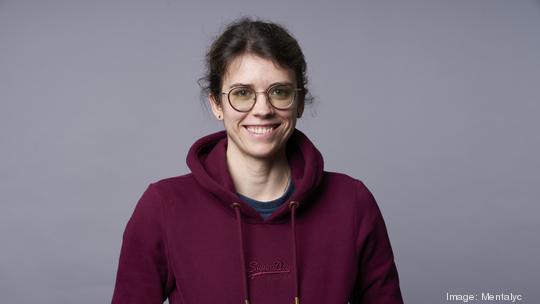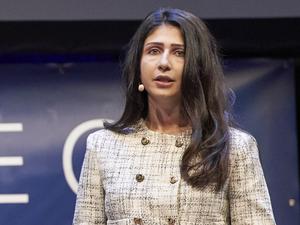
As a teenager, Maria Szandrach's parents sent her to therapy for an eating disorder but it took a while to find the right therapist. Each time felt like starting over.
"I noticed that therapists lose information, especially when I would go from one to the other," Szandrach told me. "I would have to repeat my story again and again, and they would basically miss some piece of information and I would not remember whatever they said.”
So in 2021, she co-founded Mentalyc with CTO Georgi Urumov.
The San Francisco-based startup uses artificial intelligence to automatically process and summarize notes from a therapy session.
For therapists, Mentalyc's app cuts down the amount of time that would normally be spent manually checking notes and creating summaries. Instead of spending 20 minutes combing through post-session notes, a therapist would only need to spend two to three minutes double checking and approving Mentalyc's summary, Szandrach said. It also helps ensure more accurate coding for insurance purposes.
For patients, better documentation can lead to better outcomes, Szandrach told me.
Eventually, Szandrach wants to expand the app's capabilities with machine learning in order to track a patient's progress over time. She envisions something similar to the Bloomberg Terminal, which is used in the financial industry to monitor the markets and other data.
“We also know therapists are seeing like 30 different people every week," Szandrach said, and "they're just not able to process that much information. What AI is actually great at is that it can follow patterns."
To use the app, therapists get their patient's consent and then upload audio from their one-on-one sessions to be transcribed and processed. All names and other personally identifying information is removed and the audio is automatically deleted after it's processed, Szandrach said.
The service can be used with just about any type of therapy, and Mentalyc will launch an option for couples therapy soon. The team is also working on developing an option specifically designed for "eye movement desensitization and reprocessing" therapy which is used for posttraumatic stress disorder, according to the American Psychological Association.
The company charges therapists $39.99 monthly and will eventually add an annual plan.
Building AI
Szandrach and Urumov had to build Mentalyc's AI-powered system from scratch, and that meant collecting data in a highly regulated and privacy-protected industry.
So they created the initial data they needed from holding mock therapy sessions, and also got some therapists to help with manually labeling notes. Eventually they were able to begin collecting real-world data.
Now the app processes thousands of sessions a month, Szandrach told me.
She also thinks AI has been underutilized in the mental health industry when compared to other types of medical use cases.
"Based on my discussions with hundreds of (therapists), they're commonly very empathy driven, emotional, and so on. So, I think this AI element, which is this kind of hard science… is what they need," Szandrach said. "We actually believe that we can discover basically new potential and can like help the field grow" by helping make diagnoses more accurate. "I think it can be a game changer in the field."
Raising capital
Mentalyc went through Berkeley SkyDeck's accelerator program in 2022 and while the company hasn't disclosed its total funding yet, it will be raising a seed round soon. Investors seem to be particularly cautious right now, Szandrach said.
"It's definitely hard," Szandrach said. "Every now and then we take some calls from investors to be in touch with the mood… We had a lot of calls where we would just get the knowledge out and they would say, 'we're currently not deploying any money in the next two quarters but we want to be in touch'… So we have actually a long list of investors that get updates from us."
Investors are also looking for low burn rates and real revenue.
"We optimize our targets around this and have a couple of investors who are really appreciative of this, and they are watching us to join eventually at the right moment," Szandrach said.
Mental health companies have been garnering more investor interest over the past few years.
Nationally, behavioral health startups raised $6.9 billion in 2021, triple the amount deployed in 2019, according to PitchBook.
And while investments in mental health startups declined in 2022, median deal sizes and valuations actually increased 25% and 140%, according to Silicon Valley Bank.








